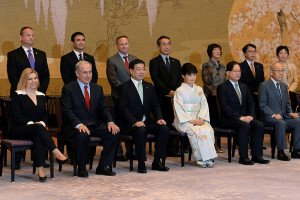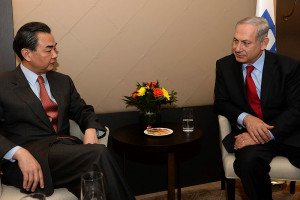 Israel Shifts Economic Focus: The Cabinet approved a comprehensive plan announced by the prime minister to strengthen economic ties with Asia and Latin America and to decrease dependence on the European market.
Israel Shifts Economic Focus: The Cabinet approved a comprehensive plan announced by the prime minister to strengthen economic ties with Asia and Latin America and to decrease dependence on the European market.
Israel Shifts Economic Focus
Approval of the plan reflects the desire to vary the Israeli economy’s trade goals so as to add high-growth areas. To this end, Netanyahu has called for the advancement of economic links with Latin America in general and the Pacific Alliance nations (Colombia, Mexico, Chile, Peru and Costa Rica) in particular.

Prime Minister Benjamin Netanyahu presents global economic plan at weekly Cabinet meeting on Sunday. (Photo: Emil Salman/Flash90)
“Last week, I returned from my visit to Japan,” Netanyahu said. “The growth of the Israeli economy depends, first and foremost, on expanding our marketing activity abroad and creating new markets. Last year, I visited China. As a result of this visit, we now see economic development and increased economic activity between the two countries. In Japan last week, there was a clear decision to deepen ties and develop economic, technological, scientific and other links between us and Japan.
“On Friday, I spoke with the prime Minister-Elect of India. There, too, there is a clear expression of the desire to deepen and develop economic ties with the State of Israel.”
‘Comprehensive Plan’ Includes Asia and Latin America
“Today, we will approve a decision – which has been submitted by the Foreign Minister and which, I think, is very important – to strengthen economic ties and develop links with the Pacific Alliance,” the Israeli leader stated. “The Pacific Alliance is a pact between five Latin American countries with a combined GDP of over $3 trillion.
“We are making a very concentrated and focused effort to vary our markets, from our previous dependence on the European market, to the growing Asian and Latin American markets, in which Israel needs to take a small market share and bring about growth, employment and social welfare in the State of Israel,” Netanyahu explained. “This is a strategic and – I think – a very promising effort. It has already begun to show results and will continue to do so. I would like all ministers, each in his or her own field, to join this important effort.”
Israel Shifts Economic Focus

Prime Minister Benjamin Netanyahu and his wife Sara at the official hosting house of the Caesar of Kyoto during a meeting with the governor of Kyoto, Keiji Yamada, last week. (Photo: Kobi Gideon/Flash 90)
In recent months, Prime Minister’s Office director general Harel Locker, along with his deputy, Yossi Katribas, and in conjunction with the Foreign, Economy, Tourism, Agriculture, Science and Technology, and Finance ministries, has led an inter-ministerial team that has formulated a comprehensive plan. The approximately NIS 50 million, 2014-2017 plan will lead to the opening of two new commercial attaché offices, in Chile and Peru, respectively; cooperation with the Inter-American Development Bank in the form of a designated fund for training and guidance, and cooperation in industrial research and development that will be jointly financed by the State of Israel and the IADB, with NIS 7 million from each side; boosting Israel’s embassies in Mexico, Colombia and Costa Rica; the implementation of a three-year plan to increase incoming tourism from Colombia and Mexico; the establishment of a Latin America desk at the Economy Ministry Foreign Trade Administration and at the Foreign Ministry Economic Branch; progress toward signing free trade and research and development agreements; the reopening of the Israeli embassy in Paraguay; the implementation of joint space projects; the establishment of a joint agricultural research fund with Mexico; progress toward signing financial protocols with Colombia, Brazil and Chile; etc. The Foreign Ministry Director General will chair an inter-ministerial team to monitor implementation of the Cabinet’s decision and carry out the government working plan in cooperation with the Latin American countries.
Great Demand in Latin America for Israeli Expertise
The combined GDP of the Pacific Alliance Nations is approximately $3 trillion and constitutes 40% of Latin America’s GDP. They form the sixth largest economy in the world, concentrate 50% of Latin America’s trade and 26% of its foreign investments (over $70 billion). The average growth of its member states is 5% and imports are expected to grow by 6% per annum. There is great demand in Latin America, especially among the Pacific Alliance member states, for Israeli technology and expertise in fields such as – inter alia – infrastructures, agriculture and science. In 2012, Israeli exports to Pacific alliance member states was just over $1 billion, approximately 2% of Israel’s total commercial exports.

Prime Minister Benjamin Netanyahu meets in Davos, Switzerland, with Chinese Foreign Minister Wang Yi at the annual meeting of the World Economic Forum (WEF) in January. (Photo: Kobi Gideon/Flash90)
Last February, Israel became an observer in the Pacific Alliance. As an observer state, Israel will be invited to take part in the staff work of the Pacific Alliance and attend its conferences, which will facilitate the advancement of cooperation with its member states.
The advantages to the Israeli economy from deepening ties with Latin America in general, and the Pacific Alliance member states in particular, are:
* Varying Israel’s export goals and increasing economic immunity to fluctuations in global markets;
* More fully utilizing the potential of trade with these countries. The State of Israel’s exports in 2013 amounted to $66.5836 billion, of which approximately 2% went to Pacific Alliance member states. In comparison, exports from the UK (a smaller economy than that of the Pacific Alliance member states as a whole) to Pacific Alliance member states was 5% of its total exports in 2013;
* Israeli exports to Latin America are very concentrated. Approximately 10 exporters account for almost 50% of total exports to the region. Government activity to enhance commercial ties with these countries will assist in opening the market to additional exporters.
(Source: Government Press Office, Jerusalem)
Thanks to United With Israel
Israel Shifts Economic Focus






